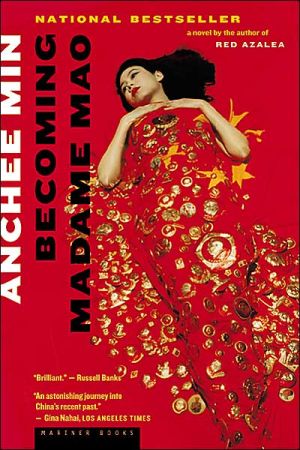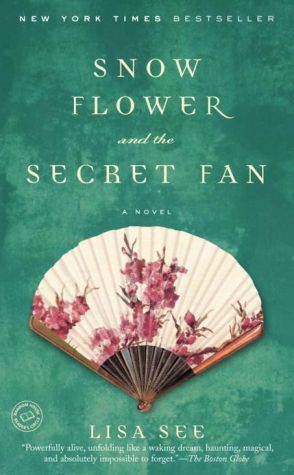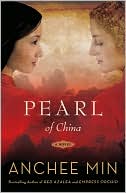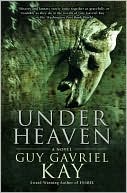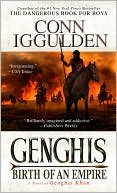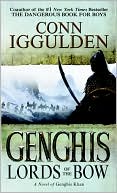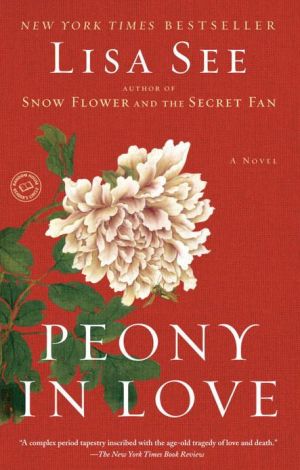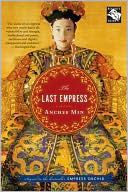Becoming Madame Mao
From the best-selling author of RED AZALEA, this extraordinary novel tells the stirring, erotically charged story of Madame Mao Zedong, the woman almost universally known as the 'white-boned demon,' whom many hold directly responsible for the excesses of the Cultural Revolution. Bringing her lush psychological insight to bear on the facts of history, Min penetrates the myth surrounding this woman and provides a "convincing, nuanced portrait of a damaged personality" (Entertainment Weekly)...
Search in google:
In a sweeping story that moves gracefully from the intimately personal to the great stage of world history, Anchee Min renders a powerful tale of passion, betrayal, and survival and creates a finely nuanced and always ambiguous portrait of one of the most fascinating women of the twentieth century. Madame Mao is almost universally known as the "white-boned demon" - ambitious, vindictive, and cruel - whose bid to succeed her husband led to the death of millions. But Min's story begins with a young girl named Yunhe, the unwanted daughter of a concubine who ignored the pleas of her mother and refused to have her feet bound. It was the first act of rebellion for this headstrong, beautiful, and charismatic girl who fled the miseries of her family life, first to a provincial opera troupe, then to Shanghai and fame as an actress, and finally to the arid, mountainous regions of Yenan, where she fell in love with and married Mao Zedong. The great revolutionary leader proved to be an inattentive husband with an insatiable appetite for infidelity, but the couple stayed together through the Communist victory, the disastrous Great Leap Forward, and the chaos of the Cultural Revolution. Min uses the facts of history and her lush, penetrating psychological imagination to take us beyond the myth of this woman who so greatly influenced an entire generation of Chinese. The result is a tragic love story of epic proportions and a novel that has all the compressed drama and high lyrical poetry of grand opera. Becoming Madame Mao will be a literary event.Barnes & Noble Guide to New FictionMin tells the "fascinating and expertly drawn" story of the woman known as the "white-boned demon" responsible for the excesses of the Cultural Revolution. Penetrating the myth, Min paints an "original" portrait of a woman driven by ambition, betrayal, and an unfulfilled need for love. Written in "spare but graceful prose," our booksellers thoroughly recommend this one.
\ \ \ \ Prologue\ \ \ What does history recognize? A dish made of a hundred sparrows - a plate of mouths.\ Fourteen years since her arrest. 1991. Madame Mao Jiang Ching is seventy-seven years old. She is on the death seat. The only reason the authorities keep postponing the execution is their hope of her repentance.\ Well, I won't surrender. When I was a child my mother used to tell me that I should think of myself as grass - born to be stepped on. But I think of myself as a peacock among hens. I am not being judged fairly. Side by side Mao Tse-tung and I stood, yet he is considered a god while I am a demon. Mao Tse-tung and I were married for thirty- eight years. The number is thirty-eight.\ I speak to my daughter Nah. I ask her to be my biographer. She is allowed to visit me once a month. She wears a peasant woman's hairstyle - a wok-lid-cut around the ears - and she is in a man's suit. She looks unbearably silly. She does that to hurt my eyes. She was divorced and remarried and now lives in Beijing. She has a son to whom my identity has been a secret.\ No, Mother. The tone is firm and stubborn.\ I can't describe my disappointment. I have expectations of Nah. Too many perhaps. Maybe that's what killed her spirit. Am I different from my mother who wanted the best for me by binding my feet? Nah picks what I dislike and drops what I like. It's been that way since she saw how her father treated me. How can one not wet one's shoes when walking along the seashore all the time? Nah doesn't see the whole picture. She doesn't know how her father once worshiped me. She can't imagine that I was Mao's sunshine. I don't blame her. Therewas no trace of that passion left on Mao's face after he entered the Forbidden City and became a modern emperor. No trace that Mao and I were once lovers unto death.\ The mother tells the daughter that both her father and she hate cowards. The words have no effect. Nah is too beaten. The mother thinks of her as a rotten piece of wood that can never be made into a beautiful piece of furniture. She is so afraid that her voice trembles when she speaks. The mother can't recognize any part of herself in the daughter.\ The mother repeats the ancient story of Cima-Qinhua, the brave girl who saved her mother from a bloody riot. The model of piety. Nah listens but makes no response. Then she cries and says that she is not the mother. Can't do the things she does. And should not be requested to perform an impossible task.\ Can't you lift a finger? the mother yells. It's my last wish, for heaven's sake!\ Save me, Nah. Any day a bullet will be put into my head. Can you picture it? Don't you see that there has been a conspiracy against me? Do you remember the morning when Deng Xiao-ping came to your father's funeral and what he did? He just brushed fingers with me - didn't even bother to shake my hand. It was as if he questioned that I was Mao's widow. He was aware of the cameras - he purposely let the journalists catch the scene. And the other one, Marshal Ye Jian-ying. He walked past me wearing an expression as if I had murdered the Chairman myself!\ Your father warned me about his comrades. But he didn't do anything to protect me. He could be heartless. His face had a vindictive glow when he made that prediction. He was jealous that I got to go on living. He would have liked to see me buried with him, like the old emperors did with their concubines. One should never have delusions about your father. It took me thirty-eight years to figure out that sly fox. He could never keep his hands away from deception. He couldn't survive a day without trickery. I had seen ghosts in his eyes stretching out their claws. A living god. The omniscient Mao. Full-of-mice-shit.\ You are a historian, Nah. You should document my role in the revolution. I want you to demonstrate my sacrifices and contributions. Yes, you can do it. Forget about what your father will think about you. He is dead. I wonder what's happened to his ghost. I wonder if it rests in its grave. Watch out for his shadow.\ The hands to strangle me are creeping up fast. I can feel them at my throat. That's why I am telling you this. I am not afraid of death if I know my spirit will live through the tip of your fountain pen to the lips of the people, generations to come. Tell the world the story of a heroine. If you can't print your manuscript in China, take it outside. Don't let me down. Please.\ You are not a heroine, Mother! I hear my daughter fire back. You are a miserable, mad and sick woman. You can't stop spreading your disease. Like Father said, you have dug so many graves that you don't have enough bodies to lay in them!\ Their dinner has turned cold. Nah stands up and kicks away her chair. Her elbow accidentally hits the table. A dish falls. Breaks. Pieces of ceramics scatter on the floor. Grease splatters on the mother's shoe. You have killed me, Nah. Madame Mao suddenly feels short of breath. Her hand grips the edge of the table to prevent herself from falling.\ Pretend that you never had me, Mother.\ You can't disown your mother!\ Well, all my hope is gone. I am exhausted and ready to exit the stage for good. The last curtain time will be tomorrow morning at five- thirty when the guards change shift. They are usually dull at that time. The old guard will be yawning his way out while the new guard yawns his way in.\ It's dark outside. A beautiful black night without stars. The prison officials have put me on a suicide watch. But they cannot beat my will. I have saved enough handkerchiefs and socks to make a rope.\ The rubber walls emit a terrible smell. But all is fine with me now. Tomorrow you will read about me in the news: Madame Mao Jiang Ching committed suicide by hanging. The day to mark is May 14, 1991. Am I sad? Not really. I have lived an extraordinary life. The great moments . . . Now as I think about them for the last time, they still make my heart hammer with excitement . . .
\ From Barnes & NobleRed Dragon \ The year is 1991, and in the bowels of a rubber-walled Chinese prison, an elderly woman pleads with her daughter to spare her life, to stop the execution that has been her destiny for 14 years. The daughter, a shadow of her mother, repeats her trembling answer, no. Seventy-seven years old and perfectly capable of taking her own life as a final act of defiance, the mother changes tack, imploring, "Document my role in the revolution. Demonstrate my sacrifices and contributions. The hands to strangle me are creeping up fast. I can feel them at my throat. Tell the world the story of a heroine."\ Her daughter, gutsier now, fires back, "You are not a heroine, Mother. You are a miserable, mad and sick woman. Like Father said, you have dug so many graves that you don't have enough bodies to lay in them!"\ Who is this iron-willed yet unredeemable woman? No less a villain than Jiang Ching, the infamous "white-boned demon," the leader of the Gang of Four, China's "whore," the woman who fought side by side with and shared the bed of Mao Zedong. Her daughter? Nah, the only child of Madame and Chairman Mao, a character who slips quickly from the pages of the fascinating and bold new novel, Becoming Madame Mao, where only the title character herself can hold center stage for long. Author Anchee Min replaces Nah with herself -- not as a fictional character inserted into history but as the biographer Madame Mao wished her daughter to become.\ Taking up Madame Mao's pen for her, Min opens her story with this question in the balance: Was Jiang Ching, Madame Mao, the female face of evil? Or was she more properly what she called herself, a heroine? Was she quite simply a ruthless torturer with the blood of millions on her hands? Or was she a more complex woman, ill served by history, the victim of both political conspiracies and the collective need of a country to blame its darkest hour on someone other than themselves?\ To Min's credit, the answer to this question does not arise easily from Becoming Madame Mao's 300-plus pages. Alternately lyrical and journalistic, in a prose style that demonstrates the split nature of its subject, the novel paints a harrowing portrait of a woman driven by a thousand different passions. She's a photographer, an opera singer, a "blade of grass to be trampled," a sensual partner, a helpless child, a "peacock among hens," a stand-by-your-man wife, a faithless lover who can find comfort in the bed of a man she doesn't love. To underline the push-pull nature of Madame Mao's motivations, Min switches back and forth between first- and third-person points of view:\ \ My lover continues to see me regardless of the pressure. I am a monk without hair (I am the law), he says. Our affair is fueled by the force to break us. Mao is a rebel by nature. In me he finds his role. Nevertheless I know what I am risking. I am nobody in Yenan. I could be removed any time in the name of the revolution.... The riverbank path leads them into deep reeds. After a half mile she suddenly pivots, says that she can't go on, that she has to leave. Like a lion to a deer he catches her and picks her up from the ground. She struggles to free herself. He becomes intense. His hands tear at her uniform. Everyone expects me to be a stone Buddha without desire or feelings, he gasps on top of her.\ The bitter prisoner at the book's opening has come a long way from days of wild love-on-the-run with the leader of the Chinese revolution. Madame Mao results from three different identities she has fashioned for herself. \ As Yunhe, a ragamuffin schoolgirl, she sees her father strike her mother with a shovel and escapes with her grandfather to watch operettas performed in whorehouses. Yunhe rejects foot binding by ripping off the bandages in the middle of the night. As Lan Ping, she becomes an opera singer, fiercely ambitious and desperate to rid herself of country-girl ignorance. She marries men for love and then finds herself unbound from them, too, in the middle of the night, ripped from their sides by ambition. Never as successful as she dreams, as Jiang Ching she abandons her leading woman costumes and flees to the countryside to don the uniform of a soldier. She falls in love with the savage warrior-poet Mao. They couple to the sound of shelling; he studies maps with his hands up her shirt.\ When she marries Mao and takes on the title role of a lifetime, Madame Mao is oddly devoid of any power. This is when the novel hits its stride, pushing and probing to understand her response to enforced weakness. Inside the Forbidden City at last, she is shut away from the public and Mao's bed and sinks into despondency. Madame Mao devises the Cultural Revolution to regain his affection and reenter the world of art and opera; she stages denouncements and orders imprisonment the way other women play coy on the telephone and take up tennis. This novel could be her revenge were it not so clear-eyed on the matter of history and consequence.\ Author of the 1997 novel Katherine, Anchee Min's connection to her material is personal. Her bestselling memoir's title, Red Azalea, comes from the film in which she was cast as the lead in the late 1970s. Based on the life of Madame Mao and funded by her Cultural Revolution movement, the film was never completed, and Min escaped to this country to become a writer of stunning lyrical power. Becoming Madame Mao is a compelling addition to Min's chronicle of a bloody time locked away by secrecy and death. It is that rare thing, a necessary work of fiction.\ —Elizabeth Haas\ Elizabeth Haas is a writer and critic living in Annapolis, Maryland.\ \ \ About the Author\ Born in Shanghai in 1957, Anchee Min has a personal connection to the story of Madame Mao. At 17, she was sent to a labor collective, where after a number of years a talent scout recruited her for Madame Mao's Shanghai Film Studio. There she was trained to play the protagonists in Madame Mao's propaganda films and personally met Jiang Ching and others in her circle, who later provided Min with stories and insights. Min came to the United States in 1984 with the help of the actress Joan Chen. Her memoir, Red Azalea, was named a New York Times Notable Book of 1994 and was an international bestseller. Her first novel, Katherine, was published in 1997. She resides in New York.\ \ \ \ \ \ Barnes & Noble Guide to New FictionMin tells the "fascinating and expertly drawn" story of the woman known as the "white-boned demon" responsible for the excesses of the Cultural Revolution. Penetrating the myth, Min paints an "original" portrait of a woman driven by ambition, betrayal, and an unfulfilled need for love. Written in "spare but graceful prose," our booksellers thoroughly recommend this one.\ \ \ Library JournalMin, who fled China in 1984 and later recounted her experiences there in Red Azalea, here rather daringly re-creates the life of Jiang Chang, wife to Mao and a political power in her own right.\ \ \ \ \ FriedmanIn this convincing, nuanced portrait of a damaged personality, Min makes it clear that Madame Mao never had as great a role as the one she wrote for herself and played in her own skin.\ —Entertainment Weekly\ \ \ \ \ Sheryl WuDunnIn prose that is simple, searing, poetic and also at times overdramatic, Min tries to give a fuller portrait of a woman many people today think of as profoundly sinister and fantastically ambitious. The result is a disturbing but appealing book . . .\ —The New York Times Book Review\ \ \ \ \ Kirkus ReviewsThe author of a wrenching memoir, Red Azalea (1994), turns to fiction and goes back to her native China to explore the story of the woman once known to the world as the `white-boned demon.` Like all girls of her class, Jiang Ching had her feet bound at the age of four. Unlike most, she never forgot the pain and humiliation, even after she became Madame Mao, the most powerful woman in China in the late '60s and '70s. Her mother's words still rang in her ears: "Think of yourself as grass, born to be stepped on." Jiang Ching never could. Instead, she channeled her agony and humiliation into a persona that allowed her to view herself as a `peacock among hens.` The author tries to portray Madame Mao as a feminist who became caught up in the chaotic political beliefs of the man she loved. But the protagonist remains a mysterious and ambiguous figure, despite Min's efforts to humanize her. The aspects of Jiang Ching's personality emphasized here—her desire for acceptance, her need for love, and her inability to express intimacy—do not create understanding or empathy for her often ruthless and megalomaniac behavior. Capable and accomplished though Min is, she never truly captures Jiang Ching's character. A remarkable act of historical imagination, but readers are left with more questions than answers. Author tour\ \
